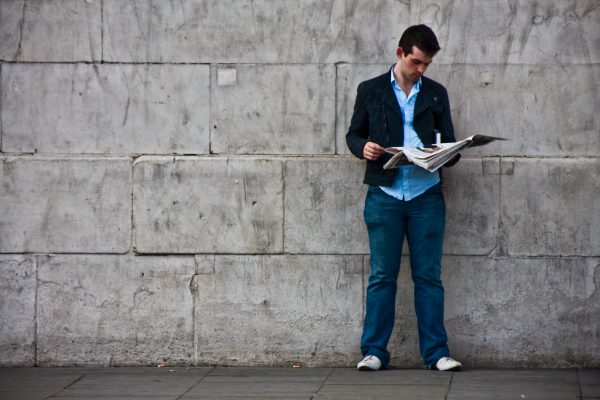
A man reads a newspaper by the wall, by Garry Knight, via Flickr CC.
This post was created in collaboration with the Minnesota Journalism Center.
According to Gallup, 45% of Americans polled trusted the mass media in 2018. Reuters Institute’s 2019 Digital News Report found similar trends among citizens in 37 countries around the globe: the average level of trust in the news is at 42%, and only 23% say they trust news they find on social media. Further, Edelman’s 2019 Trust Barometer found that, globally, people trust their employers, NGOs, and businesses before the media “to do what is right.”
Media literacy goes hand in hand with trust in the media, especially for younger generations. But studies show that news media has become neglected in media literacy education systems worldwide. To help young people in school better understand how to cultivate a sense of literacy about news consumption, educators could provide examples of what positive engagement with social media and news looks like. Studies show that recommending what young people shouldn’t do on social media — something scholars call “protectionist discourse” — isn’t very helpful.
- Notley Tanya and Michael Dezuanni. 2019. “Advancing Children’s News Media Literacy: Learning from the Practices and Experiences of Young Australians.” Media, Culture & Society, 41(5): 689–707.
- Paul Mihailidis and Samantha Viotty. 2017. “Spreadable Spectacle in Digital Culture: Civic Expression, Fake News, and the Role of Media Literacies in “Post-Fact” Society.” American Behavioral Scientist 61(4): 441–454.
- Joelle Swart. 2019. “Practising News Literacy: How Young People Develop and Express Knowledge, Skills and Competences around News on Social Media.” Presented at the 2019 Cardiff Future of Journalism Conference.
- James Klurfeld and Howard Schneider. 2014. News Literacy: Teaching the Internet Generation to Make Reliable Information Choices. Washington, DC: Brookings Institute.
Scholars argue that it is also useful to distinguish news literacy from concepts such as media literacy and digital literacy. According to Melissa Tully and colleagues, news literacy is defined as: “Knowledge of the personal and social processes by which news is produced, distributed, and consumed, and skills that allow users some control over these processes.” In this model, news literacy includes: “Context,” “Consumption,” “Circulation,” “Creation,” and “Content.”
- Melissa Tully and Emily K. Vraga. 2018. “A Mixed Methods Approach to Examining the Relationship Between News Media Literacy and Political Efficacy.” International Journal of Communication 12(0): 22.
- Melissa Tully, Adam Maksl, Seth Ashley, Emily K. Vraga, and Stephanie Craft. “Defining and Measuring News Literacy.” Presented at the 2019 Cardiff Future of Journalism Conference.

Comments